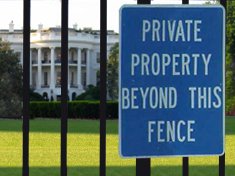
In the following excellent column, Clarence Page puts the media outrage surrounding the Vice President's hunting scandal into the context of Dick Cheney's long record as a public servant who treats public business as his own private secret business.
The inability of the White House to rein in Cheney is a nasty little reminder of who's in charge, or a reminder of the identity of our real president.
Once again, Cheney
By Clarence Page
White House reporters pounced on presidential press secretary Scott McClellan on Monday like jackals circling a wounded antelope.
"Scott, do you think that the shooting accident involving the vice president on Saturday should have been disclosed to the public on Saturday?"
"... The vice president of the United States accidentally shoots a man, and he feels that it's appropriate for a ranch owner who witnessed this to tell the local Corpus Christi newspaper, and not the White House press corps at large, or notify the public in a national way?"
"... I mean, we have BlackBerries."
Ah, hell hath no fury like a press corps scorned. You could almost hear the frustration bubbling up from past Cheney rebuffs of the public's right to know what he's been up to.
This tendency began to show itself "big time," as Mr. Cheney might say, during the Persian Gulf War. As secretary of defense, he declared a blackout that delayed news accounts for days. A pool system corralled reporters away from the action so that none produced an eyewitness account.
Less than 10 days after he became vice president, Mr. Cheney took charge of the Bush administration's energy policy task force. Under the 1972 Federal Advisory Committee Act, such task forces must conduct public meetings and keep records available to the public. Mr. Cheney declared "executive privilege" to keep his meetings and records closed and fought legal challenges all the way to the Supreme Court.
So it was hardly surprising to learn about President Bush's secret authorization of the National Security Agency to pursue terrorists through domestic eavesdropping without a warrant, in defiance of the Foreign Intelligence Surveillance Act of 1978. Long before 9/11, Mr. Cheney opposed FISA as an encroachment on the power of the executive branch.
More recently, documents filed by special prosecutor Patrick Fitzgerald in the obstruction of justice case against Lewis "Scooter" Libby, Mr. Cheney's former chief of staff, say Mr. Libby told a grand jury that his "superiors" authorized him to leak classified information in 2003 to The New York Times. The purpose: to defend intelligence used by the administration to justify the invasion of Iraq.
Could those superiors include Mr. Libby's direct boss, Mr. Cheney? Could the man who is so guarded about keeping his public and private matters private be that eager to make his political critics' private matters public?
The danger posed by Mr. Cheney's posture is not to the right of the press to snoop in the vice president's personal life, but to our constitutional system of checks and balances. The Founding Fathers, skeptical of vesting too much power in one branch of government, set up Congress and the courts to hold the executive accountable.
Mr. Cheney is hardly the first strong leader in the executive branch to try to expand his turf of unchecked power. It's up to the rest of us, including Congress and the courts, to decide whether we're going to let him get away with it.
Photo credit: Talkleft
Cheney VP Shoots Man Dick Cheney Cheney Hunting Imperial Presidency